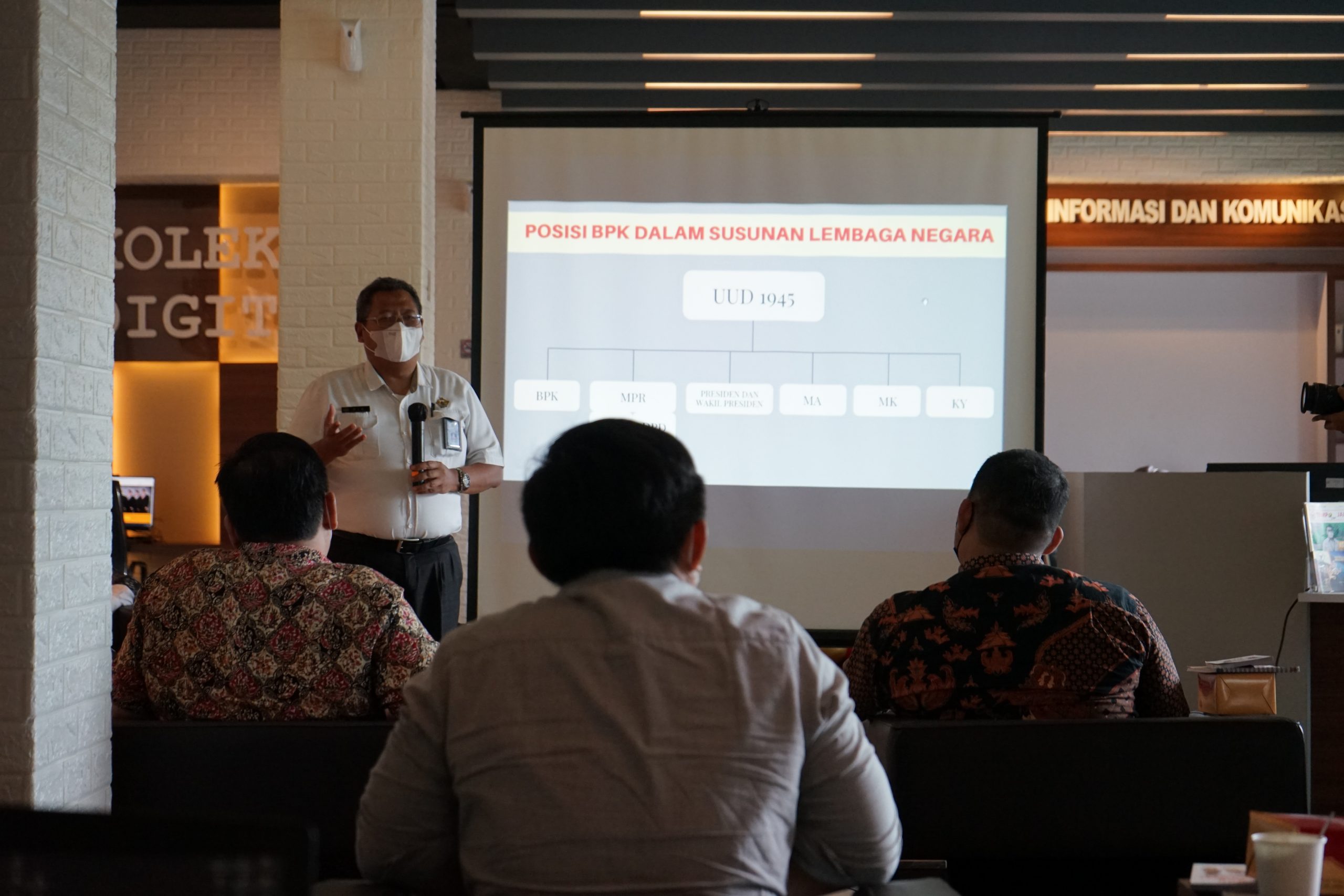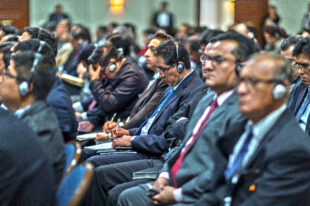Mechanisms to Enhance Community Involvement in Public Sector Audits: Evidence from SAI of Indonesia

Authors: Muhammad Rafi Bakri1, Gilbert Simson Gattang 2, SAI of Indonesia
Background
The INTOSAI community has long held a belief that the work of Supreme Audit Institutions (SAIs) should benefit the communities that they serve, and as part of that, encourage public interest and involvement in its work. In 2013, at the INTOSAI Congress in Beijing, INTOSAI adopted a new International Standard, INTOSAI-P 12 – The Value and Benefits of Supreme Audit Institutions, which recognizes citizens as key beneficiaries of SAIs’ work. In the XXIII INCOSAI Outcomes Report of 2019 (“the Moscow Declaration”), the INTOSAI community continued to recognize the importance of citizen engagement, acknowledging that “public engagement tools catalyze inspiration in the public, increase public trust, enable concentration of mutual efforts, and encourage innovative solutions to public challenges” (Moscow Declaration 2019).
In addition to the INTOSAI commitment to public engagement, Indonesian Law Number 14 of 2008 also concerns the Openness of Public Information. The law was developed with the aim of encouraging public participation in the public policy-making process, increasing the active role of the community in public-policy development and management of public bodies, and realizing a transparent, effective, efficient, and accountable state administration, amongst others things,
Based on this law, SAI of Indonesia (BPK) has developed internal regulations on public information management. One of these regulations, Regulation Number 3 of 2011, monitors the management of public information within the BPK, and ensures that it meets the principles and objectives in the Law on Public Information Disclosure. Within the BPK, the Information and Documentation Management Office (PPID) and Information and Communication Centre (PIK) is in charge of overseeing the management of public information.
PPID Application
BPK enhances the role of the community in public sector audits through three public information services, implemented by the PPID: (1) public information inquiries services; (2) public complaints services, and; (3) information objection services. This article focuses on the first two public information services. BPK has observed greater demand for publicly available information on public sector audits, such as Audit Reports and Summary of Semester Audit Reports. These products include audit reports on financial reports of the central and local governments, audit opinions and results of audit of public sector entities.
Public Information Inquiries Services
BPK reviewed and analyzed its public information inquiry services data, and found that in 2019, the public made 1,694 informational inquiries to BPK. Out of the total, the public made 1,455 inquiries for periodic information (about 86%), 3 inquiries to request for excluded information (about 0%), and 236 inquiries to request for other information (about 14%). The majority of the public inquiries made are used to inform:
- Research and research data;
- Reporting;
- Studies and contributing study materials;
- Social control, supervision, and monitoring, and;
- Publications, such as materials for preparing audit programs, investigations, completion of follow-up actions on BPK audit results.
In addition to audit report requests, PPID also receives inquiries for information related to BPK’s officialdom.
In 2020, due to the COVID-19 pandemic, BPK recognized a need to provide the public with information through digital means. To continue to serve the public virtually, BPK optimized PPID through a digital version of the program, E-PPID. E-PPID allowed for the public to have greater access to BPK’s information. Public demand for information increased significantly: BPK saw total public information service requests in 2020 increase to 14,022, or by about 728%, in 2020. This positive trend for public informational inquiries occurred again in 2021, with the number of public information service requests amounting to 18,864, or an increase of about 34.5% from the previous year. BPK will respond to all inquiries for information that meet the request requirements.
In response to public demand and interest for public sector audit information, BPK has prioritized accelerating responses to inquiries from the public. In 2021, from a total of 18,864 incoming inquiries that meet request requirements, BPK fulfilled 99.6%, or 18,788, within one to ten days. For the remainder, BPK fulfilled 59 inquiries for information within 11-17 days, and the remainder in more than 17 days.
As a result of making public information from BPK available through PPID and E-PPID, BPK can fulfill its third mission by implementing transparent and sustainable organizational governance and becoming an instance for other institutions. Moreover, this transparency can certainly escalate public participation in public sector audits.
Fig. 1: Public Information Services Through PPID

Source: SAI of Indonesia
Public Complaints Services
The BPK notes that receiving and reviewing public complaints is a key aspect of the BPK’s duties and functions as a state financial auditor. Through PPID, the public can contribute to the auditing process by reporting any actions that are deemed inconsistent with the applicable regulations. Complaints from the public can be related to audit, non-audit, or other concerns.
The Inspectorate General of BPK follows up on complaints about alleged violations of the code of ethics. In contrast, the work unit in charge coordinates and reviews complaints on audit findings. Regarding public services, the Bureau of Public Relations and International Cooperation provides complainants with information on the procedures for inquiring information.
In 2019, PPID received a total of 214 public complaints (Badan Pemeriksa Keuangan 2019). The complaints consisted of 141 complaints related to audits (about 66%), 11 complaints related to non-audit (about 7.8%), and 62 complaints related to other topics (about 29%).[1] Complaints received pertained to topics, including:
- The misappropriation of State or Regional Budget funds to government agencies (48 complaints)
- The procurement of goods/services and the use of village funds
Both of these topics are challenging for the BPK to audit. However, with assistance from the community, BPK can better focus audits related to the procurement of goods and services, and village funds to achieve targeted and impactful results.
In 2020, the misuse of the State or Regional Budget continued to be the topic of most frequent public complaints, with a total of 85 complaints (Badan Pemeriksa Keuangan 2020). The public community has played an increasingly involved role in helping BPK ensure proper oversight of the state finance and reduce harmful risk to the system. In addition, as the COVID-19 pandemic swept across the world and Indonesia, BPK received complaints in 2020 regarding the alleged misuse of funds for handling the pandemic.
The topics of public complaints received by the BPK started to diversify in 2021. BPK has observed that Indonesian society has become increasingly critical of and concerned with the response to problems related to state financial losses (Badan Pemeriksa Keuangan 2021). Allegations of corruption and misuse of the budget accounted for 14% of the total complaints received. Based on public complaints, BPK will follow up by investigating the alleged corruption. If it is proven that corruption is occurring, this public complaint services reporting will successfully ensure that state funds are not improperly diverted, and avoid financial losses.
Innovation in Community Engagement
In response to the increasing demand for public audit information, and the growing public role in the disclosure of information and transparency, BPK has made and plans further improvements to the quality of public information services.
For example, BPK continues to optimize the use of online communication channels for public interaction. In 2021, BPK developed and launched PPID Mobile, which facilitates and expedites BPK service and response to public complaints and inquiries for information. In addition, BPK conducted virtual comparative studies with ministries and agencies that already have adequate PIK facilities and infrastructure, and more established information management procedures. Based on the comparative study, BPK continues to coordinate with several stakeholders to ensure that the synergetic knowledge sharing across multiple institutions can improve public interaction with BPK.

Source: SAI of Indonesia
BPK also took innovative approaches to information services at one of its regional offices, specifically, the BPK Regional Office in Jambi. At the beginning of 2022, the Head of the BPK Regional Office in Jambi, Rio Tirta, authorized a research room called “Akustik- Akuntabilitas untuk Semua dengan TIK”, or Accountability for All through Information and Communication Technology. The BPK regional office is making this room accessible to the public to directly inquire for information related to public sector audit, thereby increasing the community’s engagement in audit.

Source: SAI of Indonesia
Even in its short time in operation, the Akustik has carried out many activities that engage the surrounding community in the audit process. For example, the Akustik has conducted outreach activities to academics, introducing the duties and functions of BPK to this group of external stakeholders. BPK provides materials, such as e-books and e-journals on audits, allowing for researchers and students to utilize public audit information as references for studies and reports. As a result, academics have increased knowledge and agency in their role to contribute to public sector audits.

Source: SAI of Indonesia
Conclusion
PPID has significantly contributed to facilitating the community’s involvement in public sector audits in Indonesia. PPID assists the BPK, the state financial audit institution, through the public solicitation of complaint information on fraud and corruption that can potentially cause state losses. With such public great demand for PPID’s services and impact, BPK’s mechanisms for public community engagement can be applied in other audit institutions and organizations to increase information accessibility and to have the public contribute to informing public audit. With community involvement and participation, SAIs can work more effectively and efficiently towards tackling fraud and corruption.
[1] Numbers may not add to 100% due to rounding.





